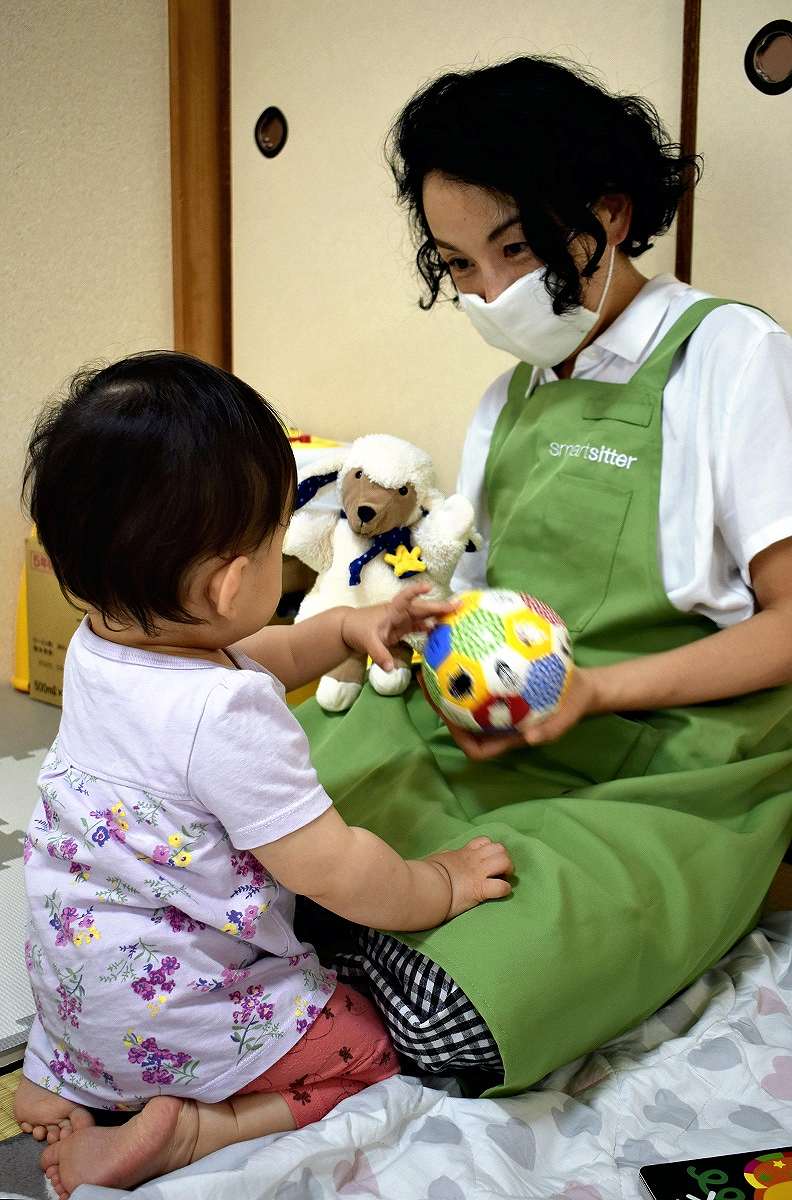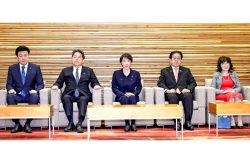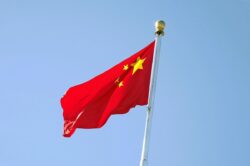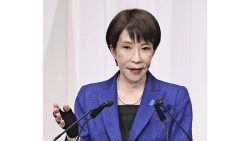
A babysitter plays with a child in Tokyo on May 31.
19:24 JST, December 7, 2020
The government and ruling parties intend to waive income and consumption taxes on municipal governments’ subsidies for babysitting services and postnatal care programs, it has been learned.
The tax exemptions are intended to support child-rearing households that have suffered economically due to the novel coronavirus pandemic, by reducing the financial burden of using such services. The measure is expected to be included in a tax reform outline for fiscal 2021 that the ruling parties will decide on by the end of this month.
Some local governments subsidize part of the cost of babysitting, childcare and other services at their own initiative to support families with children who are unable to use nationally approved day-care centers or face other disadvantages.
Under the tax law, such subsidies are treated as “miscellaneous income” and are subject to income and residential taxes. The tax reform likely will call for making the subsidies tax-free.
In Tokyo, for example, 19 wards and cities subsidize the cost of using babysitting services for children aged up to 2 who are on waiting lists to enter day-care facilities, so that users pay only 150 yen per hour. If a person with an annual income of 5 million yen hires a babysitter for 50 hours a month on average from April to December, that person must pay 210,000 yen in taxes for a subsidy of 1.0125 million yen.
Some municipalities in Chiba Prefecture and Osaka and Fukuoka cities have also provided subsidies for the use of day-care centers that are not nationally approved.
“[If the tax reform is implemented,] it will become easier to balance child rearing and work, as the financial burden of hiring a babysitter to return to work will be reduced,” said an official of Florence, a Tokyo-based nonprofit organization that offers childcare services.
The government and ruling parties also plan to waive the consumption tax on postnatal care programs implemented by local governments. If the commission fees that local governments pay to midwives associations and other entities are cut, fees for postnatal care services paid by child-rearing households could be lowered.
In fiscal 2019, a total of 941 municipalities, about half of Japan’s cities, wards, towns and villages, offered postnatal care services to support mothers and children soon after childbirth. This figure is expected to grow, as local governments will be obliged to make efforts to provide such services from April next year.
When the consumption tax rate was increased in October 2019, the central government launched a program in which preschool education and childcare services are provided free for children aged 3 to 5 and those aged up to 2 in households that are exempt from residential tax.
However, families have increasingly been forced to look after children at home, as day-care facilities have closed due to the pandemic. In light of this, the government and ruling parties intend to promote the use of private-sector services through the tax reform.
Top Articles in Politics
-

LDP Wins Historic Landslide Victory
-

LDP Wins Landslide Victory, Secures Single-party Majority; Ruling Coalition with JIP Poised to Secure Over 300 seats (UPDATE 1)
-

Japan Tourism Agency Calls for Strengthening Measures Against Overtourism
-

CRA Leadership Election Will Center on Party Rebuilding; Lower House Defeat Leaves Divisions among Former CDPJ, Komeito Members
-

Voters Using AI to Choose Candidates in Japan’s Upcoming General Election; ChatGPT, Other AI Services Found Providing Incorrect Information
JN ACCESS RANKING
-

Japan Institute to Use Domestic Commercial Optical Lattice Clock to Set Japan Standard Time
-

Israeli Ambassador to Japan Speaks about Japan’s Role in the Reconstruction of Gaza
-

Man Infected with Measles May Have Come in Contact with Many People in Tokyo, Went to Store, Restaurant Around When Symptoms Emerged
-

China Eyes Rare Earth Foothold in Malaysia to Maintain Dominance, Counter Japan, U.S.
-

Prudential Life Insurance Plans to Fully Compensate for Damages Caused by Fraudulent Actions Without Waiting for Third-Party Committee Review























